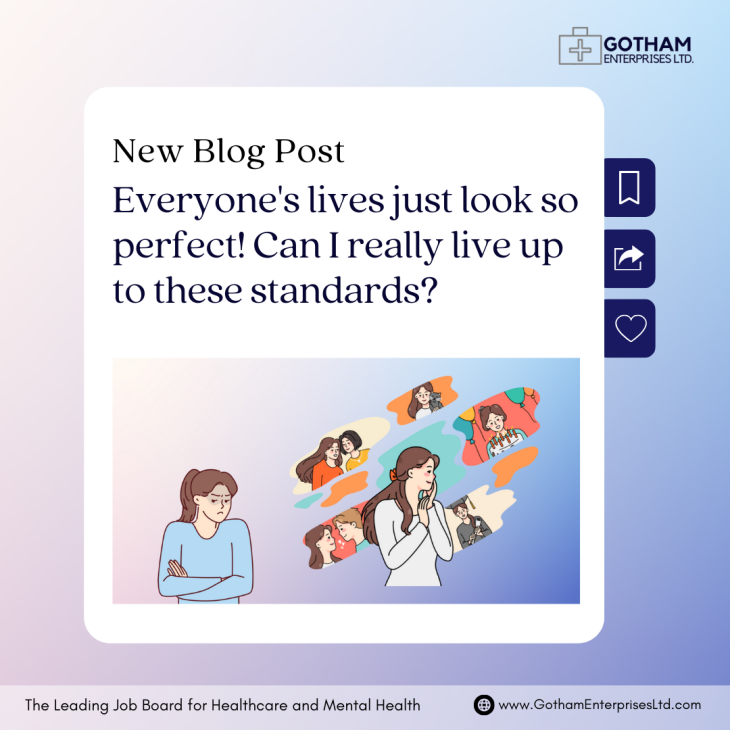Recent Posts
- I broke up with my partner, but now I am having doubts. Did I do it out of the right reasons or was I just being fearful?
- My Quick Temper Pushes People Away. What Do I Do To Manage My Anger?
- How does noise affect my mental health?
- I want to be a better problem solver. What is a step by step approach?
- Escapism. When is it healthy? When is it damaging?
Most Popular
Everyone's lives just look so perfect! Can I really live up to these standards?

Imagine walking up a busy street and seeing a young couple who obviously came from the gym looking healthy, fit and just happy. And you remember how pressed for time you were this morning to make even a quick bite for breakfast because you were running late for work. You also remember that it has been 5 months since you even had time to spare for a run or for a gym session. You hastily look away because you feel that gnawing feeling that you let yourself down by gaining some weight. But after a moment you feel a little bit better about yourself when you see a mom like yourself looking harried. What is this feeling that comes in waves at a time?
Social Comparison Theory
In 1954, Leon Festinger, a psychologist, identified this as the Social Comparison Theory. it states that the act of comparing oneself to others can result in both positive feelings of self motivation, and in negative feelings of dissatisfaction.
What’s surprising to learn is that this comparison is part of our brain’s natural function of making judgements that stem from its instinct for self-protection and diverting threats. However, depending on the type of comparison, people experience its drawbacks and advantages.
What do we compare?
The three areas we often assess ourselves against others are in the area of:
1. Money. We easily judge a person’s financial status from what we readily see them do or hear them say and quick as lightning we compare ourselves with them based on this quick judgment.
- Fame. People crave recognition; it is part of our makeup. But we frequently measure our sense of recognition and self-esteem based on what recognition others receive.
- Appearance. This may be a heavy hitter when it comes to the comparison trap. Since there will always be people who will be more attractive and less attractive than us according to social norms, judging ourselves against others in this area often leads to stress.
Types of Comparison
- Upward comparison
This happens when comparison leads to more positive experiences on our part such as becoming more motivated to work harder to improve ourselves and becoming more inspired to reach certain desirable achievements just like the person we look up to. It results in personal growth and a deeper appreciation of one’s own characteristics and results.
- Downward comparison
When we are more likely to make negative judgments about ourselves as we compare ourselves with family members, close friends, co-workers and even neighbors, the resulting feelings are compromising our mental state. It increases our risk of depending our sense of worth to the amount of good feedback we receive or don’t receive.
Since our brains are wired to take in information, assess it and compare it to our current status, the amount , speed and quality of information affect how we react to comparison.
Before Social Media
We normally compare ourselves with those closest to us. In the past, we would get updates about their accomplishments only occasionally and we have time to process our thoughts and feelings.
The Reign of Social Media
Nowadays, the updates we receive from social media arrive 24/7. We also forget that many posts have been curated to look extra pretty by edits and filters to the point of giving us an idea of perfection. Believing only what is posted feeds our negative comparison with self-doubts and discouragement.
Is this trap causing you to have hard feelings like you have fallen short of some high standard, or a sense of failure? Do you want to have healthier regulation of comparison in life? Then there are ways to break free from it.
Freedom from the Comparison Trap
- Understand comparison better. Realize that we can’t fully turn it off, but by knowing how our mind works, and setting up new patterns of thinking, we can diminish its negative effect on our mind.
- Be proactive. Social media is a powerful tool to connect and communicate. But using it passively, meaning browsing through social media without apparent purpose. Instead, an active and healthier use would be to build friendly relationships and interact with people you really like. If you struggle with limiting the time you spend on them, you can always use applications that remind you to limit social media use.
- Relieve stress. Regardless of the type of comparison, they still produce some stress that may affect our mental health and relationships. Living and enjoying life outside the realms of social media is one sure way of controlling this trap. You get to make memories that don’t need filters and edits. However, if the stress and its effects get too much, counselors or therapists can give you insights on healthy ways of thinking.
Our worth cannot be measured by the number of likes, shares or followers, and life is about creating our own piece of happiness in every life season we are in.







Comments